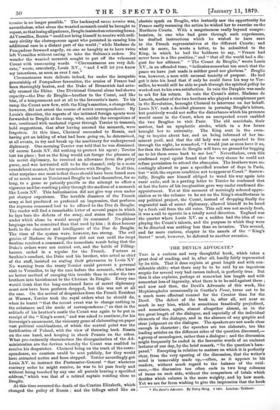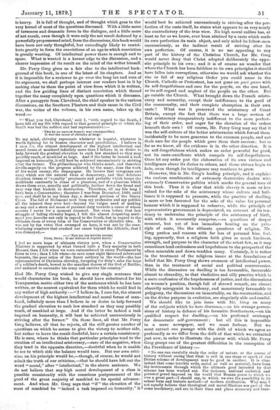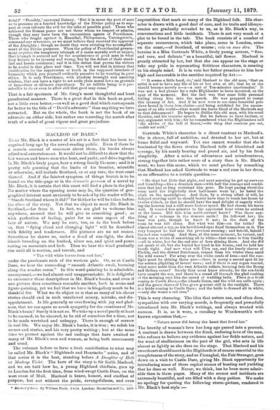THE DEVIL'S ADVOCATE.'
Tim is a curious and very thoughtful book, which takes a great deal of reading, and is, after all, hardly fairly represented by its title. That it does explain at great length and with con- siderable ability what there may be to be said by an ingenious sceptic for several very bad causes indeed, is perfectly true. But then it also explains, perhaps at somewhat less length and with somewhat less of ingenuity, what there is to be said against them ; and now and then, the Devil's Advocate of this work, like Mephistopheles occasionally in Goethe's Faust, turns out to be a much more effectual counsel for the Creator than for the Devil. The defect of the book is, after all, not near so much in any bias, which is sometimes fanatically prejudiced, and sometimes, again, almost altogether absent, as in the too great length of the dialogue, and especially of the individual elements of the dialogue, and in the absence of any graphic and clear judgment on the dialogue. The speakers are not made clear enough in character ; the speeches are too elaborate, too like leading articles on the different sides of the question discussed,— a group of monologues, rather than a dialogue ; and the discussion might frequently be ended in the favourite words of an eminent lecturer of our day, by the brief remark, " So the question's ham- pered." Excepting in relation to matters on which it is perfectly clear, from the very opening of the discussion, that the writer's mind is immovably made up,—often, as it appears to his readers, without much regard to the balance of the evid- ence,—the discussion too often ends in two long columns of items on each side, without the comparison of totals which decides which column is the more weighty, and by how much. Yet we are far from wishing to give the impression that the book * The Devil's Advocate. By Percy Greg. 2 vole. London: Tamer.
is heavy. It is full of thought, and of thought which goes to the very kernel of most of the questions discussed. With a little more of terseness and dramatic force in the dialogue, and a little more of net result, even though it were only the net result deduced by a powerfully prepossessed mind, from the discussions, this book would have been not only thoughtful, but exceedingly likely to contri- bute greatly to form the convictions of an age to which conviction is greatly wanting. Of intellectual power there is enough and to spare. What is wanted is a keener edge to the discussion, and a
clearer impression of its result on the mind of the writer himself. Mr. Percy Greg gives us a fair clue to the intellectual back-
ground of this book, in one of the latest of its chapters. And as it is impossible for a reviewer to go over the long ins and outs of its argument, we shall perhaps interest our readers best in it by making clear to them the point of view from which it is written, and the few guiding lines of distinct conviction which thread together the many completely open questions which it discusses.
After a panegyric from Cleveland, the chief speaker in the various discussions, on the Southern Planters and their cause in the Civil war, the writer of the volume, in his own name, takes up the word :—
4, 4 What you feel, Cleveland,' said I, ' with regard to the South, I have felt all my life with regard to that general principle of which the South was but the noblest and last representative:— . This by no narrow bounds was circumscribed, It was the cause of chivalry at large.'
To my mind, chivalry represents whatever is hopeful, whatever is worth fighting for in human character and possibilities. I believe in I care for, the utmost development of the highest intellectual and moral forms of manhood infinitely more than I believe in or desire to help forward the gradual elevation to such low standard as they may possibly reach, of mankind at large. And if the latter be indeed a task imposed on humanity, it will beat be achieved unconsciously in striving after the former. The philanthropist who thinks much, and therefore dwells eagerly on the progress achieved by the many, does the work of his worst enemy, the demagogue. He fosters that arrogance and envy which are the natural vices of democracy, and that delirious drunken dream of equality' proximate and probable which keeps the multitude constantly in chase of a phantom, and of a phantom which draws them ever, morally and politically, further down the broad and easy way that leadeth to destruction. Therefore, all my life long I have been a Conservative ; therefore I was from December, 1860, until now, and shall be to my latest day, a devoted partisan of the Starry Cross. The fall of Richmond took from my profession and my politics all the interest they ever had—beyond the vulgar need of making money and a stern sad sense of personal duty towards a cause of whose success I never for a moment dreamed. But even before that last struggle of fading chivalry began, I felt the almost despairing senti- ment you describe not only in regard to the South, but in regard to the ultimate doom of every form of the Conservative or chivalric idea. It was not by the votes that swamped us here, it was not by the over- whelming numbers that crushed our cause beyond the Atlantic, that I was dismayed,—
Non me tua fervida terrent Dicta, faros; di me torrent et Jupiter host's.'
I feel no more hope of ultimate victory now, when a Conservative Ministry is supported by what Gerard calls a Tory majority in both Houses, than I felt when we wore outnumbered in every Parliament by three to two ; than I felt when—to save some eight thousand sabres and bayonets, the poor relics of the finest soldiery in the world—the last representative of Christian chivalry, foregoing for duty's sake the hope of a soldier's death, bowed to the manifest decree of the God of Battles, and endured to surrender his army and survive his country."
Had Mr. Percy Greg wished to give any single sentence that would characterise his book, he should have substituted for his Tennysonian motto either two of the sentences which he has here written, or the nearest equivalent for them which he could find in any writer of high authority :—" I believe in, I care for, the utmost development of the highest intellectual and moral forms of man-
hood, infinitely more than I believe in or desire to help forward the gradual elevation to such low standard as they may posiibly reach, of mankind at large. And if the latter be indeed a task imposed on humanity, it will best be achieved unconsciously in striving after the former." On these lines, all that Mr. Percy Greg believes, all that he rejects, all the still greater number of questions on -which he seems to give the victory to neither side, but rather to leave the result doubtful, have a certain consistency. He is sure, where he thinks that particular principles tend to the creation of an intellectual aristocracy,—sure of the negative, when
they tend in the opposite direction,—doubtful when he is unable to see to which side the balance would turn. But our own criti-
cism on his principle would be,—though, of course, he would not admit the truth of our criticism,—that he should have left out the word "moral," after "intellectual," in the above sentence. We do not believe that any high moral development of a class is possible consistently with the conscious postponement of the good of the great majority of mankind to its special advance- ment. And when Mr. Greg says that "if " the elevation of the mass of mankind be "indeed a task imposed on humanity," it would best be achieved unconsciously in striving after the per- fection of the caste itself, he states what appears to us very nearly the contradictory of the true view. No high moral calibre has, at least so far as we know, ever been attained by a caste which made its own perfection its main object, and only aided its fellow-men unconsciously, as the indirect result of striving after its own perfection. Of course, it is no use appealing to any part of the history of the Christian Church, for Mr. Greg would never deny that Christ adopted deliberately the oppo- site principle to his own ; and it is of course no wonder that
where the Church has been faithless to its own principles it should have fallen into corruptions, otherwise we would ask whether the rise or fall of any religious Order you could name in the Church, Catholic or Protestant, has not gone on pari passu with its self-forgetfulness and care for the people, on the one hand, or its self-regard and neglect of the people on the other. But
go outside the Church. What brought down the French aristo- cracy and monarchy, except their indifference to the good of the commonalty, and their complete absorption in their own caste ? What was it preserved the aristocracy of Great Britain, except the fact that there was a large section of that aristocracy comparatively indifferent to the mere perfect- ing of their order, and eager for the elevation of the orders beneath their own ? Of course, Mr. Percy Greg may say that it was the self-culture of the better aristocracies which forced them incidentally to be more generous to the common people, and not their care for the people which gave them their success ; but so far as we know, all the evidence is in the other direction. It is its self-forgetfulness which makes an order powerful for good, not its caste-excellence which compels its self-forgetfulness. Once let any order put the elaboration of its own virtues and intelligence above its duties to others, and those virtues begin to fade, even though its intelligence may continue to grow.
However, this is Mr. Greg's leading principle, and it explains the curious combination of extremely destructive doubts with extremely Conservative politics which marks the general tone of this book. Thus it is clear that while slavery is more or less valued for the sake of the aristocracy whose culture and bril- liance it is supposed to promote, while the practice of duelling is more or less favoured for the sake of the value for personal honour which it is supposed to subserve, while the principle of representative government is depreciated, on account of its ten-
dency to undermine the principle of the aristocracy of birth, with which it necessarily competes,—on questions of deeper moment, but yet of less immediate bearing on the prin- ciple of caste, like the ultimate questions of religion, Mr. Greg probes and reasons with far less of personal bias, feel.
ing, apparently, that a religious faith gives as much hardness, strength, and purpose to the character of the select few, as it may sometimes lend enthusiasm and hopefulness to the prospects of the often miserable and down-trodden many. Certainly, it is rather in the treatment of the religious issues at the foundations of belief that Mr. Percy Greg shows evenness of intellectual power, than in the treatment of social and political controversies. While the discussion on duelling is too favourable, favourable almost to absurdity, to that vindictive and silly practice which is a mere confession of the hopelessness of justice, and the discussions on woman's position, though full of shrewd remark, are almost absurdly misogynist in tendency, and monstrously favourable to polygamy, the discussions on immortality, on the resurrection, and on the divine purpose in evolution, are singularly able and candid.
We should like to join issue with Mr. Greg on many of the subjects which he here discusses,—on his strange perver- sions of history in defence of his favourite Southerners,—on his qualified respect for duelling,—on his profound contempt for democratic self-government ; but all this is impossible to a mere newspaper, and we must forbear. But we must extract one passage with the drift of which we agree as profoundly as we differ from the drift of that which we extracted just now, in order to illustrate the power with which Mr. Percy
Greg grasps one of the greatest difficulties in the conception of the Providence of history:— "No one can carefully study the order of nature or the course of history without seeing that what is evil in one stage or epoch of the Divine scheme of development may be good in another. It is clear indeed that some terrible evils, moral as well as material, have been the instruments through which the ultimate good intended by that scheme has been worked out. For instance, national ambition sad personal greed imposed on the world that Roman peace to which we owe a great part—I should say, to which we owe the possibility in its actual form and historic method—of modern civilisation. Why may I not equally believe that theological and moral illusions are part of the same machinery, and are in their time and place necessary and bene-
ficial ?" Possibly,' answered Dalway. 'But it is never the part of man so to presume on a fancied knowledge of the Divine policy as to sup- port or even tolerate the evil for the sake of possible good. Those who achieved the Roman peace are not those whom we respect or admire, though they may have been the unconscious agents of Providence. Those who fought against it, Hannibal, Philopcemen, Vercingetorix, command our reverence, as we must believe they received the approval of the Almighty ; though no doubt they were resisting the accomplish- ment of the Divine purposes. When the policy of Providential govern- ment requires the temporary triumph of a cause morally evil or unjust, that triumph is secured not by the acquiescence of good men in what they believe to be tyranny and wrong, but by the defeat of their stead- fast and heroic resistance; and it is this defeat that proves the victors to be useful in that place and time. You will not find in history that justification for the suppression of truth in the supposed interests of humanity which you yourself evidently perceive to be wanting in pure ethics. It is only Providence, with absolute foresight and unerring wisdom, that can have a right to set aside plain moral laws on grounds of immediate or ultimate expediency. To no fallible being is it per- missible to do or even to allow evil that good may come."
That is a fair specimen of Mr. Greg's most thoughtful and least paradoxical manner. There is a great deal in this book as good, not a little even better,—as well as a good deal which corresponds far better to the title of "Devil's advocate" than anything we have extracted. But on the whole, the book is not the book of an advocate on either side, but rather one recording the search after truth of a mind of great vigour and great prejudices.








































 Previous page
Previous page